China – Move fast & break things
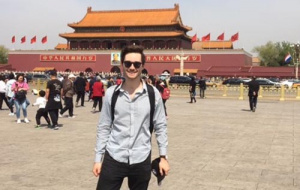 David and Lois Sykes Scholarship Travel Report – Leo Bureau-Blouin (2016, Law and Finance)
David and Lois Sykes Scholarship Travel Report – Leo Bureau-Blouin (2016, Law and Finance)
Yinuo is the director of the Chinese office of an international charity. She recently came back to China after studying and working in the United States for a few years. Sitting in a boardroom in downtown Shanghai, she is reflecting about how fast things are changing in China. “Most of us can’t go to the house where we were born. It does not exist anymore. It has been destroyed and replaced by high rises.” Her tone is a mix of sadness and proudness. She is proud because China is developing at fast pace and lifting millions out of poverty in the process. However, fast development came at a cost.
Historical buildings are being torn down to make way for shopping malls. Younger generations are turning their back on traditions and are dreaming of a western lifestyle. Cities like Beijing are so polluted that masks are now fashion accessories. Millions have been displaced for pharaonic projects such as the three-gorge dam. And to accomplish such a rapid development, the Chinese State has imposed tough restrictions on individual freedoms – online and offline.
In April 2018, I explored Yinuo’s China with a group of 15 students from Oxford University. We visited one of the oldest and richest human civilisation that joined the league of capitalist nations at high speed and high cost.
Part I: Shanghai and Huangzhou (1 April to 7 April) – The Economy Goes Virtual, and So Does Government Control
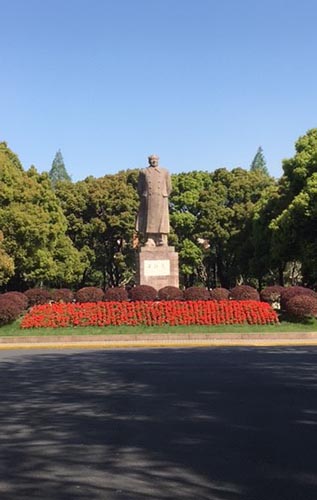
Statue of Chairman Mao in the city of Hangzhou
“I have not used cash in years. I pay everything with my phone”, says Xilin – a Chinese DPhil student at Oxford and our guide for the next two weeks. As soon as we landed at Shanghai Pudong airport, his first suggestion was thus to quickly get a SIM card so that we could use AliPay, a mobile payment app developed by the Chinese tech giant Alibaba. Xilin was right. Epayment is a big thing. AliPay claims 450M users. Its rival WeChat Pay – developed by another tech giant Tescent – has 600M users.
Too bad for us, the Chinese authorities recently put new restrictions on digital financial services and one needs a Chinese bank account to use AliPay. We will have to go old school and use cash. Bank notes feature Chairman Mao. A reminder that the country is technically communist. Hard to believe in a city like Shanghai where skyscrapers feature logos like CitiBank, Goldman Sachs and others.
This is not the only restrictions that the government imposes on digital activities. When I opened my phone for the first time, I could not help but notice that websites like Google, Amazon, Facebook and Twitter were all blocked. It serves obvious censorship purposes but also economic objectives. Thanks to the Great Firewall, the Chinese tech industry is largely sheltered from any western competition.
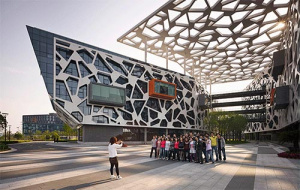
Headquarter of Alibaba in Hangzhou
Source: HasselStudio
The city of Hangzhou – home of Alibaba – illustrates the rapid growth of Chinese tech firms and their impact on Chinese society. Alibaba’s incredible growth created incredible wealth for its founder – Jack Ma. Inspired by western philantro-capitalists such as Bill Gates, Jack Ma recently created its own foundation. We visited Ma’s foundation to learn more about philanthropy in China. Philanthropy is a new phenomenon in a society where private property, let alone private foundations used to be very restricted. But newly made billionaires want to signal their wealth and power. Philanthropy is one way to do it. We learned that Jack Ma plans to support the education of young Chinese in rural parts of the country. It seemed to create tensions with the State as it means an acknowledgement that there are problems in these communities. It also gives a lot of visibility to a character like Jack Ma. This can be threatening for the State. The future of philanthropy seems uncertain in China.
The office of Jack Ma’s foundation is in a “start-up neighbourhood” inaugurated a few years ago. It is home to dozens of businesses. A great opportunity to learn more about the start-up ecosystem. Surprisingly, not much was happening in Hangzhou’s start up campus when we visited. In fact, it was dead silent. Perhaps, the starts ups had not moved in yet or had already moved out.
Doing business in China is not easy. Restrictions from the government can be an instant killer for many firms. The app Jinri Toutiao (Today’s Headlines) is a good example. A few days after we visited Hangzhou, this news aggregator was shut down because it did not feature enough pro-government content. The problem is that the app was based on an algorithm that shows news that people want to see. How do you fix that? Even Tencent – another tech giant – was prevented from releasing a new video game later in 2018. The company took a $20 billion hit on the stock market. The government justified his intervention by the fact that Chinese youth spend too much time gaming. The tension between the desire of the country to move towards a free market economy and the reluctance of the State to let go its power is very visible in the tech industry.
The “Chinese Model” Has A Western Flavour
Our next stop was at Shanghai Jia Tong University. One of the top university in the country. There we met Zang Wei Wei – an intellectual who advocates in favour of the “Chinese model”. Our discussion focused on the flaws of the western model. Trump being the latest manifestation of the inherent flaws of democracy according to Wei Wei. He argued that the “Chinese Model” that mixes free market with heavy government control on civil liberties is the way to go. I tried to unpack what the “Chinese model” meant as we were leaving the talk. How can you justify authority under such a regime? Wei Wei justified governmental control by the fact that the masses are not educated enough and that they can be tricked. What do university students our age think about all of this? Don’t they think it is a bit patronizing?
We then met with students from Jia Tong University. Many of us were intrigued by the role of the communist party and asked some students if they were members or if they would like to be – a legitimate question considering that the party has approximately 130M members and that many high positions require membership. “No. I would like to work for a consultancy or a large bank”, said one of them. He represents a new generation of Chinese citizens who enjoy high standards of living and are born after the pro-market economic reforms of the 90s. He is part of the now 430 million strong Chinese middle class. This number is expected to grow to 700 million in the mid-2020s.
Downtown Shanghai illustrates well the society in which the student we met grew in. We went to the Bund – a water front area that offers an incredible view of Shanghai’s skyline. In front of us, an ocean of skyscrapers covered in lights. But 20 years ago, there was nothing. Xilin showed us pictures to show the contrast. The contrast was so stark it was hard to believe it.

Downtown Shanghai (Today vs. 1990)
“Would you like to do some shopping?” asked Xilin at the end of downtown visit. (Shopping malls are the most visible signs of China’s incredible growth and expanding middle class.) “New shopping malls are opening every year, I can’t keep track” joked Xilin. Shopping malls are indeed impressive. They are big, shiny, luxurious and full of people. It was sometimes hard to know if one was in Shanghai, an airport or pretty much anywhere in the United States. I thought about what it meant for the world. Is this what the future will look like?
While we strolled through what seemed like a never-ending maze of shopping malls, I wondered where the historical buildings were. Turns out that most historical buildings are being torn down or have already been destroyed. The cultural revolution resulted in the destruction of numerous temples and historical buildings. Some say that the development of the last 20 years in China has been even more damaging. Once again, I wondered how Chinese perceive their own history and the way forward. The country seemed to be animated by the famous start up mentality: “move fast and break things”. But is this sustainable? To me, historical buildings and heritage sites are a reminder of where we come from, or what we have been through collectively. It gives a meaning to the present and the future. I wondered if China will eventually feel the need to reconnect with its past.
To celebrate our trip in Shanghai, we were invited to a private club inspired by British gentlemen’s club. It featured a collection of expensive scotch bottles and a medieval-inspired coat of arms. The explanatory flyer given to us was a mix of self-congratulatory texts and pictures of the all-male club membership. It was founded by the emerging financial elite of the country that wants to signal its wealth. After this display of wealth, we went back to our shared dorms and limited supply of hot water.
We ended our Shanghai trip with a visit of the French Concession. Our guide explained to us that Shanghai has long been linked to the West because of its colonial heritage. The city was once divided between a French and an English concession. To this day, there is a fascination for the western lifestyle. The French and the English might not rule here anymore, but after witnessing so many shopping malls, gentlemen’s clubs and others, I thought to myself that the “western way of life” was still there.
Part II: Beijing (7 April to 14 April) – In China, Things Go as Fast as the Trains
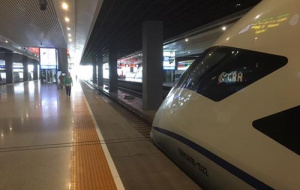
A high-speed train in China
After a few days in Shanghai, we took the high-speed train to Beijing. One thousand five hundred kilometres in four and half hour. The high-speed is a symbol of the Chinese economic transformation. Academics and intellectuals that we met often mentioned it as an example of the Chinese model superiority over the West. I did not know if it was better than the French TGV or the Eurostar but I must say that it was definitely better than the Great Western Railway between Oxford and London.

Source: Silent Hill/Imagine China
In Beijing, we visited a venture capital firm led by the co-founder of New Oriental – a company that made a fortune by offering English language classes online. The thirst for western education is profitable. There were 68 000 Chinese students in the US in 2006, there are now 350,000. Zhen Fund is supporting the next generation of Chinese tech firms. One of them is Ofo – a shared bike company. Their shared bikes were everywhere in Beijing – literally everywhere. For only a few yuans, one can use a shared bike and leave it wherever. It revolutionized transportation but also created a major challenge in terms of urban management. Many argue that it became a nuisance and that these companies use the public space for free. But investors see it as an opportunity and the company is now valued at more than one billion dollars.
At least, companies like Ofo contribute to the reduction of gas emission – a major challenge in Beijing. It was hard to see the top of skyscrapers because of the pollution while we were there and apparently the air had not been that good in a while. The improvement in air quality in Beijing was partly due however to the displacement of factories further away from Beijing. In addition, about a million people had been forced to move out of Beijing because they did not own an internal passport called Hukou. The Hukou gives citizens access to local welfare such as hospitals. Some of them had only been given a few days to evacuate their home. On top of that, the use of coal has been heavily restricted. Good news for me. But no good news for poor households who relied on coal to heat themselves. Again, this proved the efficacy of the Chinese authorities but also the brutality associated with policies implemented at such fast pace.
In the subsequent days, we met dozens of ambitious Chinese students. Their questions revolved mostly around the US, the UK, how it was to study abroad. Each member of our delegation also presented an idea or a project he or she was working on to a delegation of students and academics from Chinese universities. I chose to talk about my role as a student representative and as an elected official during a student strike against the rising cost of education in Quebec. Those events resulted in elections and a change of government. As I started speaking, I realized that there was a bit of discomfort in the audience. Ishhhh. I forgot that concepts like “protests”, and “challenging the government”
were a bit sensitive here. Nonetheless, students enjoyed my talk and I received positive feedback.
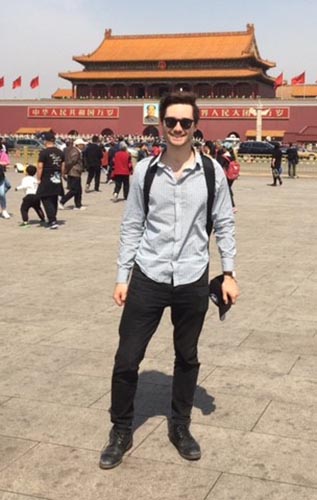
Tiananmen Square
Limiting Online and Offline Public Gathering by Design
Our Beijing itinerary also included a few must see such as Tiananmen Square and the Forbidden City. One of the thing I noticed when we visited Tiananmen Square was how heavily secured it was. One needs to pass metal detectors, show its ID and be under constant surveillance in order to access the square. I had never seen so many security cameras in the same place. Once I arrived on the plaza, I also realized that it is one of the only open space we saw so far in Beijing. Seemed as if the planning of the city was done to avoid public gathering.
Public gatherings online were also controlled. An Australian that we met over lunch explained to us with passion how social media like WeChat were being monitored and controlled. First, the number of members in an online group is limited to 500. To invite more members, one needs the authorization of the platform. The members of the group can then “invite” new members to join. By doing so, one becomes responsible for the behaviours of those that he invited. On top of that, certain sensitive political messages are simply impossible to send. You can hit the send button and the message will appear as if it was sent, but the recipient will never receive it. The platform will “intercept” the message. The state apparently justifies these limitations as a way to fight the proliferation of “fake news”.
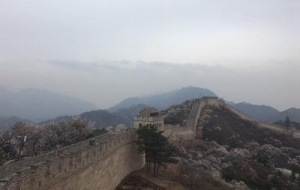
The Great Wall at the end of the day
We finally ended our Chinese trip with a tour of the Great Wall. As always in China, the numbers are astounding. The wall is a 21 000-kilometre-long fortress designed to protect China from an invasion. When I walked on the wall, I thought another time about how China’s past and future. China was once inward looking and defensive; its youth is now outward looking. The Chinese emperor once destroyed all its navy fleet because it feared free trade. The Chinese navy is now rebuilding, and Chinese ships are exporting everywhere in the world. Historical buildings used to be everywhere. Skyscrapers now dominate the landscape. China changed. It changed fast. But as I stand on the great wall I remind myself that it was built hundreds of years ago and that it will still be there in hundreds of years. I guess that gives consolation to people like Yinuo that cannot visit the house where they were born. It gives people like her a permanent place that serves as an historical anchor and stepping stone for the future. China might move fast and break things but at this precise moment, I understand why its faith in its future seems rock solid.
Find out more about the range of travel grants and scholarships available to assist Univ students on our Travel Grants page or read further travel reports.
Published: 16 January 2019
Explore Univ on social media
